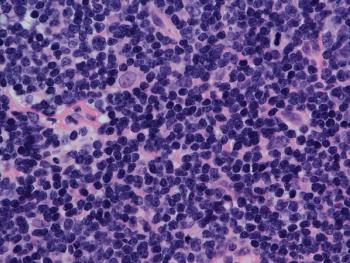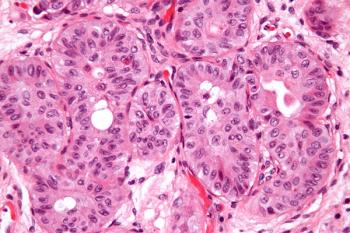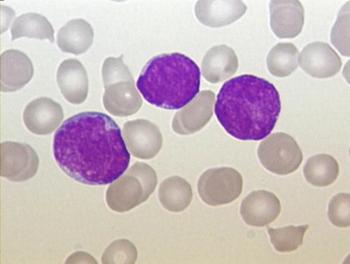
89Zr-DFO-girentuximab improves sensitivity and specificity in identifying clear cell kidney cancer compared with any metric to date, according to an expert from the University of California, Los Angeles.

Your AI-Trained Oncology Knowledge Connection!


89Zr-DFO-girentuximab improves sensitivity and specificity in identifying clear cell kidney cancer compared with any metric to date, according to an expert from the University of California, Los Angeles.

Prior exposure to recent bendamustine and having tumor-intrinsic features were associated with inferior efficacy outcomes following treatment with brexucabtagene autoleucel in relapsed or refractory mantle cell lymphoma.

The FDA states that the refusal to file letter for SGX301 in early-stage cutaneous T-cell lymphoma was because the new drug application was insufficient for permit substantive review.

Experts from Emory Winship Cancer Institute discuss how the FDA approval of sacituzumab govitecan will impact the treatment of breast cancer.

Patients with locally advanced or metastatic renal cell carcinoma with a clear-cell component who receive first-line cabozatinib after checkpoint inhibitor combination therapy appear to have early responses.

Updated results from the phase 3 CheckMate 9ER trial continue to support nivolumab plus cabozantinib as a first-line treatment for patients with advanced or metastatic renal cell carcinoma.

Patients with metastatic pancreatic ductal adenocarcinoma who receive NALIRIFOX tend to have more gastrointestinal toxicity while nab-paclitaxel/gemcitabine results in more cytopenias, according to an expert from University of California, Los Angeles.

When combined with nivolumab and ipilimumab, cabozantinib appears to improve outcomes over placebo for patients with advanced, intermediate-risk renal cell cancer, and showed some efficacy among the poor-risk population.

Results from the phase 3 IMvigor130 trial reveal a trend towards overall survival improvement when atezolizumab plus chemotherapy was given to patients with locally advanced or metastatic urothelial carcinoma vs placebo.

An exploratory analysis indicates that overall survival did not improve with the use of single-agent atezolizumab in untreated locally advanced or metastatic urothelial cancer.

Pembrolizumab appears to achieve antitumor activity in terms of disease-free survival in patients with Bacillus calmette-guerin–unresponsive, papillary high–risk, non-muscle invasive bladder cancer.

Extended follow-up findings further support the use of nivolumab as a standard of care in high-risk muscle-invasive urothelial carcinoma following radical resection.

Rucaparib yields improved efficacy compared with docetaxel plus androgen receptor pathway inhibitors in metastatic castration-resistant prostate cancer harboring BRCA mutations.

Data from the phase 2 TROPHY-U-01 trial support further evaluation of sacituzumab govitecan in patients with metastatic urothelial cancer following immune checkpoint inhibitor therapy, according to the lead investigator.

Investigators observe low rates of treatment discontinuation and adverse effects with radium-223 as treatment for castration-resistant prostate cancer and bone metastases.

Findings from the phase 2 UNITE study indicate that certain biomarkers may help inform clinical decision making and sequencing in patients with advanced urothelial carcinoma.

Almost half of patients with muscle-invasive bladder cancer in a phase 2 trial had clinical complete responses following transurethral resection of bladder tumors plus nivolumab and chemotherapy.

Niraparib plus abiraterone and prednisone continue to improve outcomes among patients with metastatic, castration-resistant prostate cancer and HRR gene alterations, according to interim data from the MAGNITUDE study.

Long-term safety data from the phase 3 ARAMIS rollover trial support the use of darolutamide in patients with nonmetastatic castration-resistant prostate cancer, according to an expert from the Carolina Urologic Research Center.

In a final overall survival analysis of the phase 3 PROpel study, abiraterone actetate/olaparib demonstrates a sustained trend toward overall survival for metastatic castration-resistant prostate cancer vs standard-of-care abiraterone.

Findings from the phase 3 ARASENS trial indicate that darolutamide plus androgen-deprivation therapy and docetaxel should be considered a new standard of care for metastatic hormone-sensitive prostate cancer.

Treatment with talazoparib and enzalutamide appears to yield a statistically significant and clinically meaningful radiographic progression-free survival benefit compared with placebo/enzalutamide in frontline metastatic castration-resistant prostate cancer regardless of homologous recombination repair status.

Data from the European phase 1 MB-105 trial indicate that the safety profile of annamycin in geriatric advance acute myeloid leukemia are consistent with previously reported findings.

Adverse effects including light sensitivity and blurred vision lead to a clinical hold in enrollment for the phase 1/2 VERA trial evaluating BLU-222 in advanced solid tumors.

Treatment with 177Lu-PSMA-617 results in similar survival benefit regardless of when it was administered after radium-223 in patients with metastatic castration-resistant prostate cancer, according to an expert from University Hospital of Münster in Germany.

Phase 3 KEYNOTE-859 trial data favor pembrolizumab plus chemotherapy over chemotherapy alone in the frontline setting for metastatic or unresectable gastric or gastroesophageal junction cancer.

Darolutamide produces a lower rate of discontinuation compared with enzalutamide or apalutamide among patients with non-metastatic, castration-resistant prostate cancer.

An expert from the University of Texas MD Anderson Cancer Center says that ponatinib plus reduced-intensity chemotherapy may be a new standard of care for frontline Philadelphia chromosome–positive acute lymphoblastic leukemia.

Talha Badar, MBBS, MD, discussed ongoing trials in the treatment of chronic myeloid leukemia in chronic phase, as well as his hope for future therapies in the space.

Sikander Ailawadhi, MD, discussed the safety and efficacy of talquetamab in heavily pretreated patients with relapsed/refractory multiple myeloma following a readout of the phase 1/2 MonumenTAL-1 trial.